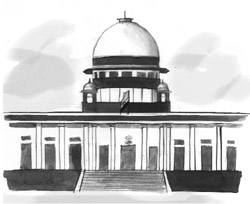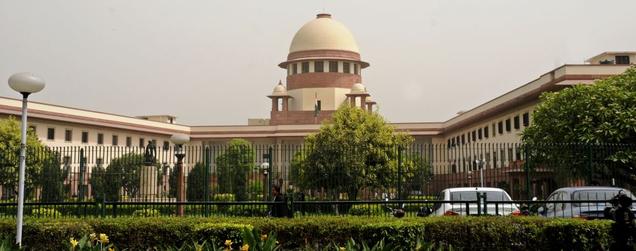Don’t embark on a futile exercise, Shanti Bhushan tells Supreme Court Constitution Bench
The Press Council of India (PCI) on Tuesday suggested that the Supreme Court frame guidelines for the media as these would be in the interest of not only administration of justice and rights of the litigant public but also the media themselves.
“The media, both print and electronic, have been playing an important role in shaping and sustaining Indian democracy,” senior counsel P.P. Rao, appearing for the PCI, told a five-judge Constitution Bench headed by Chief Justice S.H. Kapadia. “The scheme of the Press Council Act itself shows that the intention of Parliament is to allow self-regulation by the media as far as possible. While the print media is within the purview of the Press Council Act, the electronic media is not. Therefore, it is desirable to lay down guidelines for both the print and electronic media to follow in reporting court proceedings, rather than making statutory rules.”
Mr. Rao told the Bench, which included Justices D.K. Jain, S.S. Nijjar, Ranjana Desai and J.S. Khehar, that the court, while framing the guidelines, might take into consideration the relevant norms of journalistic conduct laid down by the PCI. Explaining the powers of the PCI, counsel said: “Section 14(1) of the Press Council Act confers on the Council power to warn, admonish or censure the newspaper, news agency, the editor and the journalist or disapprove [of] the conduct of the editor or the journalist, as the case may be, after holding an enquiry into the complaints. The Council, which is presided over by a retired judge of this court and in which editors, working journalists and managements of big, medium and small newspapers are represented, has laid down Norms of Journalistic Conduct. Self-regulation is always better than statutory regulation. However, when any TV channel, newspaper or news agency fails to adhere to the guidelines laid down by this court, appropriate orders may be passed in the facts and circumstances of each case.”
“Dissolve Bench”
The former Law Minister, Shanti Bhushan, appearing for some journalists, asked the CJI to dissolve the Constitution Bench hearing the present case, saying it would be a futile exercise. He cited an instance of the former CJI, Justice A.N. Ray, dissolving a 13-judge Bench after he found no support for his case. Mr. Bhushan was referring to a move by Justice Ray, who set up the 13-judge Bench to reconsider the Kesavananda Bharti judgment in which the court had held that Parliament had no right to amend the basic structure of the Constitution.
Mr. Bhushan asked the Bench not to embark on a futile exercise which would be detrimental to the rights of the press and destroy democracy in this country. “No purpose will be solved by going through this exercise.”
Taking the Anna Hazare argument, he argued that people were sovereign in India. “That is the reason why even the right to freedom of press was not absolute in this country. It was instead left to Parliament to lay down reasonable restrictions on this freedom. All institutions in our democracy are people’s institutions. Even the judiciary is accountable to the people. People have a right to know what is happening.”
“Abridge freedom”
Senior counsel Anil Divan, appearing for the Editor of The Hindu, Siddharth Varadarajan, commenced his arguments, pointing out the anomaly of the court deciding to lay down guidelines which in this case would “abridge” the freedoms of individuals instead of “protecting” them or “disciplining” officials. Mr. Divan cited the ‘Visakha judgment,’ saying that in that case the court was only seeking to protect fundamental rights of citizens. But in this case the Bench was embarking on a quasi-legislative exercise as once the court framed guidelines they would become immune from judicial review. “I will have no remedy. But tomorrow, if Parliament were to adopt these guidelines, the person aggrieved will have a remedy. I can challenge them before you.”
Mr. Divan said the exercise undertaken by the court was not prudent in view of globalisation of information dissemination technology. “If the guidelines will be coercive or binding in nature, then it is covered by the legislative process.”
The CJI intervened, and said: “The deliberations on the guidelines were not a result of adversarial litigation. We are only trying to regulate the media to the extent that the rights of person in criminal cases are protected under Article 21 [Right to life and liberty] of the Constitution.”
The CJI asked Mr. Divan to address the question whether the rights of the press could be balanced to ensure administration of justice and protect the rights of the accused to ensure a free trial in a criminal case.
Arguments will continue on Wednesday.
Related articles
- SC will begin contemplating ‘framing of guidelines’ for court reporters (indialawyers.wordpress.com)
- ‘Amending power is unique’ (indialawyers.wordpress.com)
- CJI writes to govt proposing National Court Management System (indialawyers.wordpress.com)
- Reporting guidelines: Supreme Court expands scope of deliberations (indialawyers.wordpress.com)
- The public needs both gavel and pen (indialawyers.wordpress.com)

